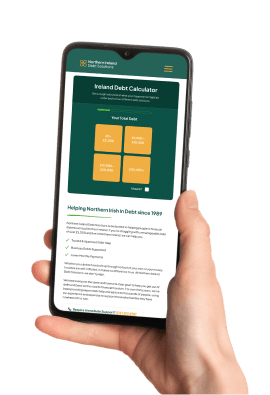If you’re unable to repay a debt, your creditor may enlist the services of a debt collection agency to help them recover their money. Essentially, debt collectors don’t have any specific or additional rights when attempting to secure repayment, and aren’t allowed to force entry into your property.
Some debt collectors may try to intimidate you by exaggerating their level of authority and legal power, but it’s important to remember that you don’t have to let them in if they arrive at your home.
Bailiffs and debt collection
The role of ‘bailiff’ no longer exists in Northern Ireland. If a creditor has been unable to recoup their money they may decide to use a debt collection agency, or progress the process further by taking enforcement action.
The Enforcement of Judgment Office, or EJO, is a department of the Northern Ireland Courts and Tribunal Service that exists to enforce money, goods, and property judgements. They charge a fee to the creditor for their services, which is then added to the overall amount of debt owing.

Can a debt collection agency force entry to your home?
Your creditor may pass the collection of your debt to an agency – the agency either ‘buys’ the debt, or receives a pre-agreed percentage of the amount they’re able to recover. Once a debt collection agency takes over, you’ll need to deal with them directly rather than with the creditor.
They’re likely to telephone or contact you by letter, and in some cases will call at your home. As we mentioned earlier, however, debt collectors don’t have any right to force entry. You’re under no obligation to answer the door or communicate with them, but if you do allow them in, they must leave when asked.
Does the EJO have any rights of entry to your property?
If the EJO becomes involved in the collection of your debt, the Enforcement of Judgments Officer may wish to interview you at your home to establish your financial position, or request that you attend a meeting at a different venue. If they visit your property, they have no right to force entry.
It’s advisable to comply with their requests for interview, however, and to provide them with the information requested. Failing to meet with the EJO when requested can result in a warrant for your arrest, and the police will bring you to the interview.
Once the Enforcement of Judgments Officer has established your financial situation, and decided whether or not you have the means to repay in instalments, a decision will be made as to how the debt will be paid back.
If you require further advice or assistance in dealing with debt collection agencies in Northern Ireland, or the Enforcement of Judgment Office, Northern Ireland Debt Solutions can help. We’ll ensure you understand your rights in these circumstances, and your options in dealing with the situation. Call one of our expert team to arrange a free same-day meeting.
Browse more topics related to this article
Get Started – Contact The Team Today
Ready to take the first step to a debt-free future? Contact Northern Ireland Debt Solutions today to understand your next steps.




